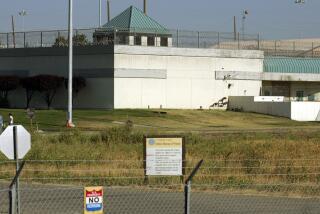The National Park Service is melting down over harassment charges in its 100th anniversary year
It is known for its giant sequoia trees, towering granite ridges and tumbling waterfalls. But one of the West’s most majestic national parks has now become the latest cauldron in an unfolding scandal over workplace harassment that has rocked the national parks system.
Just days after the abrupt retirement announcement last week of Yosemite National Park Supt. Don Neubacher, some of those long familiar with operations at the 1,169-square-mile landmark in Central California were saying the blowup could have been foreseen.
“I warned Don Neubacher about that immediately after he came here six years ago,” said George Whitmore, a longtime Sierra Club activist who said the park has been plagued with a “toxic culture that manifests in internal vendettas and political attacks.”
The scandal at Yosemite is only the latest in a series of revelations about sexual harassment and bullying that have roiled America’s national parks, leading to the resignations of at least four senior national park managers this year and a series of congressional hearings.
The part of the Park Service culture that facilitates these problems is ... within a militaristic hierarchy led by officials who believe they can do no wrong.
— Jeff Ruch, executive director, Public Employees for Environmental Responsibility
What was supposed to be a year of celebration for the National Park Service’s 100th anniversary has turned into a year of accusation, with critics railing that the agency charged with protecting American treasures, from Alaska’s Bering Land Bridge to Buck Island Reef in the Virgin Islands, has failed to protect its own employees from gender bias, bullying and harassment.
The controversy exploded in January, after the inspector general’s office disclosed an investigation prompted in 2014 by a letter to Interior Secretary Sally Jewell from 13 current and former employees — all of them women — saying that their complaints of widespread sexual harassment had not been addressed.
Congressional hearings in June led to the removal of officials at Grand Canyon and Canaveral National Seashore for their failure to appropriately handle such accusations. Then the focus turned to Yosemite.
2016 wasn’t supposed to unfold this way.
Standing in June on Yosemite’s Sentinel Bridge, with Half Dome in the background, President Obama called the national parks “the envy of the world” and praised the National Park Service on its centennial.
“I want to thank Supt. Neubacher and all the incredible rangers and staff for hosting us here at Yosemite,” he said. “They do a great job. We’re so proud of them.”
Neubacher’s career unraveled shortly thereafter — followed by his wife’s.
At a Sept. 22 hearing of the House Committee on Oversight and Government Reform, Chairman Jason Chaffetz (R-Utah) said that of the 21 people federal investigators interviewed earlier this year, all but one “described Yosemite as a hostile work environment as a result of the behavior and conduct of the park’s superintendent.”
Grilling a ranking Park Service official about the situation at Yosemite, he asked: “You have somebody on your staff who is essentially protected and empowered by his wife. How do you let that happen?”
Park employees, it turns out, had not only accused the park superintendent of failing to adequately address the widespread complaints of harassment. They also said they feared that his wife, Patty Neubacher, the deputy regional director of the Pacific West Region, had protected him with her influence as an official partly responsible for overseeing 56 national parks in six Western states.
Three days after her husband’s retirement announcement, Patty Neubacher said that she, too, would be stepping down.
The Neubachers’ retirements begin in November.
Last week, as rangers struggled with budget shortfalls and traffic that can turn a beloved park into a parking lot, the congressional oversight committee threatened to hit the Park Service with a subpoena to force the release of documents including an internal report on its employees’ accusations.
Critics, meanwhile, are waiting to see how the agency, which oversees more than 23,000 permanent and temporary employees located in 411 units, will handle the problems some say are undermining the very concept of national parks as cherished refuges.
Jeff Ruch, executive director of the advocacy group Public Employees for Environmental Responsibility, argues that the anguish expressed by some employees stems from the agency’s basic structure.
“The part of the Park Service culture that facilitates these problems is a sort of caste system within a militaristic hierarchy led by officials who believe they can do no wrong,” he said. “That problem is compounded by a decentralized federal agency in which park superintendents have the autonomy of a ship captain.”
“The result is a dysfunctional power dynamic,” he added, “in which problems raised by rank-and-file employees are not allowed to leave the park, or are strongly discouraged.”
Indeed, the Park Service ranks close to the bottom among 320 federal agencies ranked by the annual Best Places to Work in the Federal Government survey. Only one of the Interior Department’s 12 subagencies had a lower score in 2015: the Office of Surface Mining.
Now the agency is playing catch-up.
In June, David Uberuaga, superintendent of Grand Canyon National Park, retired in response to complaints from 13 female employees of being bullied, belittled, propositioned for sex, physically threatened and inappropriately touched and photographed over the last 15 years by boatmen in charge of leading educational floats along the Colorado River.
In September, Myrna Palfrey, superintendent of Canaveral National Seashore in Florida, resigned after the congressional oversight committee began examining allegations of mismanagement and an ongoing sexual harassment case in which she allegedly took no corrective action.
Investigators are also looking into a complaint filed by Robert L. Hester, an engineering equipment operator at Yellowstone, of what he described as “talk and acceptance of sexual exploitation of female workers in the Special Projects Division.”
“They spoke openly about a certain female employee with Special Projects, a laborer who never did any work,” he said. “This laborer was kept drunk by our supervisor and they were involved in a relationship, which was common knowledge throughout Yellowstone Park.”
Based on a quote from novelist Wallace Stegner, Ken Burns titled his 2009 PBS documentary series “The National Parks: America’s Best Idea.”
Federal officials now say that the year of accusations against the National Park Service will also be a year of reformation.
Secretary Jewell has said that the catalog of sordid incidents may be “just the tip of the iceberg.” As the investigative process continues, she said, “we will find there is a bigger issue, a culture that allows these things to go on, that needs to change.”
ALSO
NBA star Derrick Rose’s ex-girlfriend testifies in civil trial that he raped her
5 killed as Hurricane Matthew makes landfall in South Carolina and continues up the East Coast
More to Read
Start your day right
Sign up for Essential California for news, features and recommendations from the L.A. Times and beyond in your inbox six days a week.
You may occasionally receive promotional content from the Los Angeles Times.







